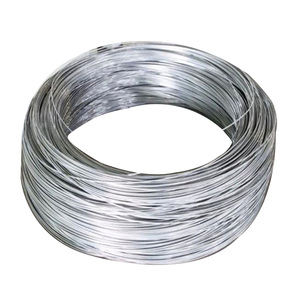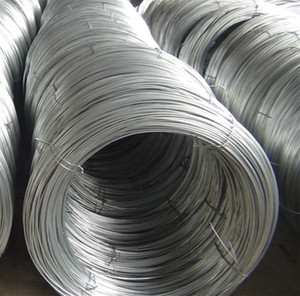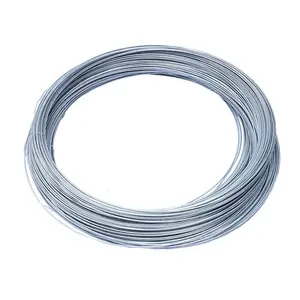
All categories
Featured selections
Trade Assurance
Buyer Central
Help Center
Get the app
Become a supplier

(6245 products available)













































Galvanized wire refers to wire that has been coated with a layer of zinc to protect it from rust and corrosion. It is primarily made of iron and steel for durability purposes. The 10 gauge galvanized wire comes in different types to suit particular requirements.
Galvanized Steel Wire
This wire is coated with zinc and is ideal for use in areas that require high tensile strength and resistance to corrosion. It can be employed in a vast array of outdoor or industrial applications, including fencing, construction, and marine settings. The galvanized coating distinguishes it by its silver-like appearance and enhanced resistance to rust.
Galvanized Iron Wire
Galvanized wire made from iron is less commonly used and consists of 10 gauge iron wire coated with zinc to enhance corrosion resistance. Often it is utilized in light-duty applications that require flexibility and moderate resistance to rust. It is popular in agricultural fencing and netting. While it is cost-effective, the wire has less tensile strength compared to steel varieties.
Low Carbon Galvanized Wire
This wire is made from low-carbon steel, offering better flexibility and workability without sacrificing significant durability. It is suitable for manufacturing products such as wire mesh, barbed wire, and other engineering applications where the gauge of the wire comes with manageable tensile strength. Anti-corrosion properties make it ideal for outdoor use.
High Carbon Galvanized Wire
High carbon galvanized wire has increased tensile strength and hardness. It is used in heavy industrial applications where high durability and minimal flexibility are required. It is suitable for heavy machinery, tools, and any other applications that require longevity and minimal wire deformation.
Some important features of galvanized steel wire 10 gauge are listed below.
Increased corrosion resistance
The wire is covered with a coating of zinc that acts as a sacrificial barrier against corrosion. Even after the wire has been scratched, the zinc will always protect the steel by retarding rust or oxidation. This makes it ideal for long-term applications in harsh environments, weather, and moisture.
Tensile Strength
Since it is classified as a 10-gauge wire, it has a significant tensile strength. This makes it suitable for tightly-bound applications as well as resistance against stretching, snapping, and deformation under immense stress. The diameter of the wire also ensures that it is robust enough for heavy-duty industrial usage.
Flexibility
Despite its tough exterior, 10-gauge galvanized wire retains some degree of flexibility. This allows for easy handling, bending, and shaping without breaking. While it is sturdy enough to resist heavy strains, it can still be worked into shapes or tightly-bound webs.
Longevity
Owing to its galvanized coating, the 10-gauge wire is designed for durability over a long period in diverse applications. It withstands mechanical stresses as well as environmental factors like moisture, so it requires almost no maintenance after installation.
Versatility
The gauge and properties of 10-gauge galvanized wire make it useful in a wide variety of applications. These range in fencing and construction to agriculture and crafts. Its strength, flexibility, and resistance to rust allow it to adapt to multiple DIY and professional needs alike.
10 gauge Galvanized Wire has many industrial and agricultural applications. A few of these applications are as follows.
Industrial Applications
The wire is used in industry as binding material for holding together items in palletized shipments or for tying heavy cargo to prevent shifting during transportation. Since it is resistant to rust and weather elements, it is suited for both indoor and outdoor construction applications. It can be used to make concrete reinforcement, mesh, and frames.
Agricultural Fencing and Animal Pens
Galvanized wire is mostly used in agricultural fencing. It is ideal for enclosing livestock pens, run-ats, and chicken coops because of its rigidity and corrosion resistance. The wire is used to manufacture barbed wire or smooth wire fence. Its resistance to the elements extends the lifespan of the fence with no maintenance required.
Wire Mesh and Netting
Galvanized wire is used in poultry netting and rabbit wire as well as other forms of wire mesh used in garden protection and landscaping. The 10-gauge thickness makes the mesh strong enough to resist biting and burrowing from animals while still being light enough for easy handling and installation.
Support and Suspension Systems
The wire can be used in ceiling suspension systems by providing support to tiles or other ceiling structures. In construction, workers use it to create support scaffolding where the wire holds the scaffolding boards in tight-bound positions. In landscaping, it is used to hold mulch socks or erosion control blankets in place during soil stabilization.
Craft and DIY Projects
Due to its solid yet flexible characteristics, 10-gauge galvanized wire is often used to manufacture wreaths, sculptures, and other craft-related items. Since it does not rust or corrode, it is a preferred material for outdoor decorations that are exposed to different weather elements all year round. It is also used for making trellises, plant supports, and garden decorations.
When choosing the perfect option among galvanized iron wires , consider the following factors to ensure that the wire suits your needs and remains durable in the environment where it will be used.
Quality of Galvanization
Choose wires that have been galvanized through a hot-dipping process. This form of galvanization guarantees much thicker zinc coatings than electro-galvanized wires. Thicker coating enhances corrosion resistance for extended periods. Where possible, ask suppliers for details about the galvanized wire's corrosion resistance standards, such as ASTM or ISO certifications.
Material Composition
Select wires made from steel or iron, as these provide the ideal balance between flexibility and strength. Wires made from low-carbon steel are particularly suited for projects that require easy manipulation without compromising tensile strength. High carbon steel is better for applications where maximum rigidity and strength are required.
Diameter and Gauge Size
10-gauge wire is about 3.4 millimeters in diameter. It is quite strong and suited for various structural and agricultural applications. Consider diameter and gauge size and weigh them against intended usage. A thicker wire provides outstanding support and strength, while a thinner wire allows for easier handling and bending.
Wire Flexibility and Brittleness
Wire brittleness will cause it to snap under pressure, whereas wire flexibility allows it to bend without breaking. For applications such as trellises or crafts where extensive manipulation is needed, flexibility is critical. If heavy-duty support is needed, flexibility might be less critical as longer wire lengths will be used for support.
Corrosion and Rust resistance
Ensure the zinc coating is not scratched, worn, or damaged, as this exposes the underlying steel or iron to moisture, resulting in rust formation. For coastal regions or areas that are prone to high humidity, consider wires with thicker galvanized coatings for enhanced durability against rapid corrosion.
Some questions and answers about the gauge galvanized steel wire to help one understand better.
Q1. What does gauge refer to for 10-galvanized wire?
A1. Gauge is a standard measurement of wire diameter. It is approximately 3.5 millimeters thick. This wire is quite strong and is ideal for a myriad of applications, such as fencing, crafts, and construction.
Q2. Is 10 gauge galvanized wire flexible?
A2. This wire is relatively flexible compared to thicker wires. It allows for easy bending and shaping without breaking. However, it is stiff enough to provide strong support for heavy objects.
Q3. Can the wire be used for electric fencing?
A3.Yes, this wire can be used for electric fencing. Because of its conductivity, it will carry the electric current necessary for the fence to work effectively. In addition, it is strong and durable for outdoor conditions.
Q4. Is 10 gauge wire thicker than 12 gauge wire?
A4. Yes, 10-gauge wire is thicker and stronger than 12-gauge wire. It is suitable for stronger applications, such as heavy-duty fencing, support structures, and electrical wiring, while 12-galvanized wire is typically used for lighter applications requiring flexibility.
Q5. How long will 10-gauge galvanized wire last?
A5. 10-gauge wire is expected to last for 20–30 years. The galvanized coating protects the wire from rust and corrosion, providing extended durability even in outdoor environments.